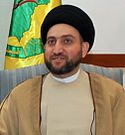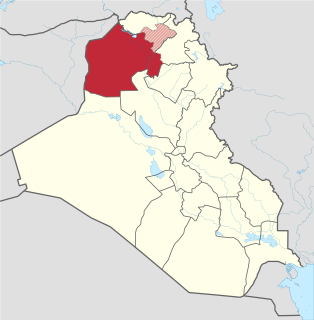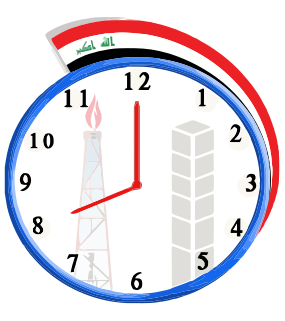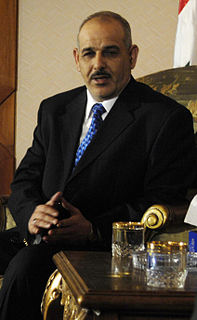| |||||||||||||||||||||||||
| |||||||||||||||||||||||||
447 seats comprising 14 of the 18 governorates of Iraq | |||||||||||||||||||||||||
|---|---|---|---|---|---|---|---|---|---|---|---|---|---|---|---|---|---|---|---|---|---|---|---|---|---|
| |||||||||||||||||||||||||
Colours show the largest list in every governorate State of Law Coalition Shiite List Liberal Coalition Muttahidoon Kurdistan Alliance Independents/Local List Elections not held | |||||||||||||||||||||||||

 |
|---|
| This article is part of a series on the politics and government of Iraq |
| Constitution |
Legislature |
Judiciary |
|
|
Governorate or provincial elections were held in Iraq on 20 April 2013, to replace the local councils in the governorates of Iraq that were elected in the Iraqi governorate elections of 2009. [1] Elections took place in 12 of Iraq's 18 governorates. Elections didn't take place in the 3 governorates forming the Kurdistan Region [2] [3] or Kirkuk, Anbar, or Ninevah, meaning that a total of 378 provincial council seats were up for election. [4] [5]

Iraq, officially the Republic of Iraq, is a country in Western Asia, bordered by Turkey to the north, Iran to the east, Kuwait to the southeast, Saudi Arabia to the south, Jordan to the southwest and Syria to the west. The capital, and largest city, is Baghdad. Iraq is home to diverse ethnic groups including Arabs, Kurds, Assyrians, Turkmen, Shabakis, Yazidis, Armenians, Mandeans, Circassians and Kawliya. Around 95% of the country's 37 million citizens are Muslims, with Christianity, Yarsan, Yezidism and Mandeanism also present. The official languages of Iraq are Arabic and Kurdish.

Iraq presently consists of 19 governorates, also known as "provinces". As per the Iraqi constitution, three or more governorates can join to form an autonomous region. Baghdad and Basra are the oldest standing administrative regions of Iraq while In 2014 the decision was made to create the Halabja Governorate out of the Halabja District of Sulaymaniyah Governorate.

Iraqi Kurdistan, officially called the Kurdistan Region of Iraq by the Iraqi constitution, is an autonomous region located in northern Iraq. It is also referred to as Southern Kurdistan, as Kurds generally consider it to be one of the four parts of Greater Kurdistan, which also includes parts of southeastern Turkey, northern Syria, and northwestern Iran.
Contents
- Electoral Law
- Participants
- Preliminary results
- Results
- Total Seats
- Al Anbar Governorate
- Babil Governorate
- Baghdad Governorate
- Basra Governorate
- Dhi Qar Governorate
- Diyala Governorate
- Karbala Governorate
- Maysan Governorate
- Muthanna Governorate
- Najaf Governorate
- Ninawa Governorate
- Al-Qādisiyyah Governorate
- Salah ad Din Governorate
- Wasit Governorate
- References
The Iraqi government later decided on 19 March to delay the elections in the governorates of Anbar and Nineveh due to ongoing instability caused by the insurgency and the ongoing protests, [6] [7] prompting criticism from Muqtada al-Sadr [8] and John Kerry. [9] Elections for Anbar and Nineveh were held on 20 June. [10]

Al Anbar Governorate, or Anbar Province, is the largest governorate in Iraq by area. Encompassing much of the country's western territory, it shares borders with Syria, Jordan, and Saudi Arabia. The provincial capital is Ramadi; other important cities include Fallujah and Haditha.

The 2012–13 Iraqi protests started on 21 December 2012 following a raid on the home of Sunni Finance Minister Rafi al-Issawi and the arrest of 10 of his bodyguards. Beginning in Fallujah, the protests afterwards spread throughout Sunni Arab parts of Iraq. The protests centered on the issue of the alleged sectarianism of Prime Minister Nouri al-Maliki. Pro-Maliki protests also took place throughout central and southern Iraq, where there is a Shia Arab majority. In April 2013, sectarian violence escalated after the 2013 Hawija clashes. The aggressive protests continued throughout 2013, and in December Maliki used security forces to forcefully close down the main protest camp, in Ramadi. Sunni groups, such as the Army of the Men of the Naqshbandi Order, took up arms in response, and joined forces with the General Military Council for Iraqi Revolutionaries (GMCIR), a militant group made up of former Ba'athists, to conduct a military campaign against the Iraqi government. The Islamic State of Iraq and the Levant (ISIL) would later grow out of this civil conflict.

Muqtada al-Sadr is an Iraqi Shia cleric, politician and militia leader. He is descended from the Hashimites. He is the leader of the Sadrist Movement and the leader of Saraya al-Salam, a Shia militia that is a reformation of the previous militia he led during the American occupation of Iraq, the Mahdi Army.















